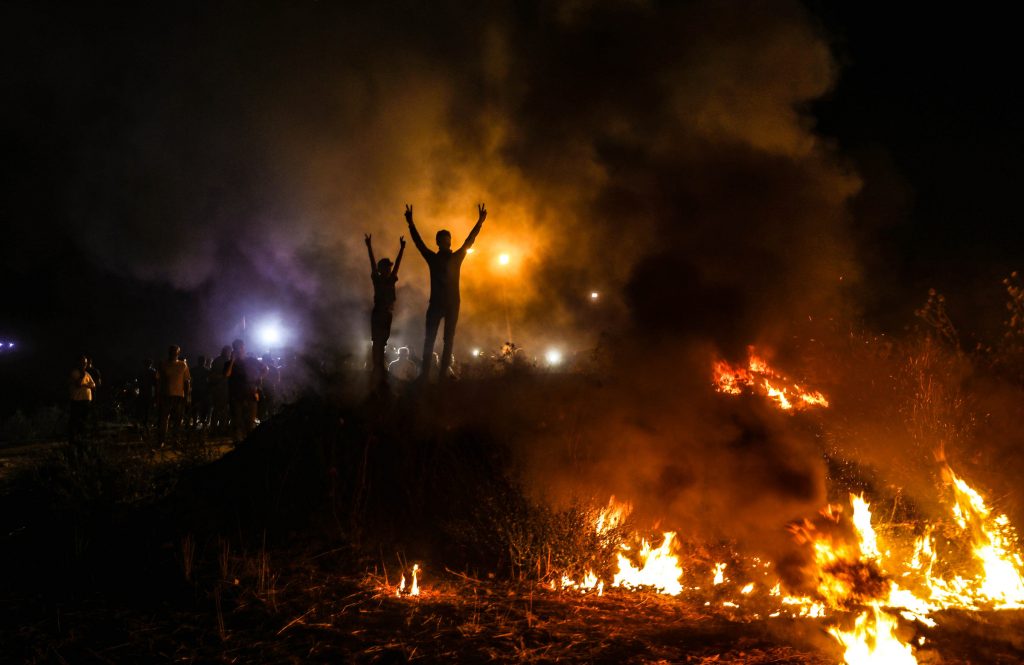
Once a month, we put together a list of stories we’ve been reading: news you might’ve missed or crucial conversations going on around the web. We focus on environmental justice, radical municipalism, new politics, political theory, and resources for action and education.
We try to include articles that have been published recently but will last, that are relatively light and inspiring, and are from corners of the web that don’t always get the light of day. This will also be a space to keep you up to date with news about what’s happening at Uneven Earth.
This month, Palestine and Israel were all over the news. We collected some useful reading lists, essays and photo stories so you can dig deeper beyond the bite-size tweets and Instagram posts. Photography runs like a thread through our May readings: we featured a photo essay that documents the deep scars mining has left on our planet, and another on China’s ‘Cancer Villages’. We do have reasons to celebrate this month, though: a court in the Netherlands has ruled in a landmark case that the oil giant Shell must reduce its emissions, and Germany has formally recognized the atrocities committed against the Herero and Nama people of what is now Namibia as genocide, paying reparations of €1.1 billion ($1.3 billion). On top of that, we included our editor Aaron Vansintjan’s new piece on the insights on the imagination and the practice of democracy that the late David Graeber has left us with, an explainer on how Nigeria’s forests are being decimated to make charcoal for barbecues in Europe and the United States, and much more.
A small note that the articles linked in this newsletter do not represent the views of Uneven Earth. When reading, please keep in mind that we don’t have capacity to do further research on the authors or publishers!
Uneven Earth updates
GDP | What is GDP, and why should we learn to live without it?
Brave New Normal | Cultivating cooperative, self-sustaining communities can undermine destructive economic systems and offer meaningful responses to social-ecological crises in the wake of the pandemic
Top 5 articles to read
Eye-catching abstract photos reveal mining’s scars on our planet
Do you know where your grilling charcoal comes from?
David Graeber: The power of the imagination. “For many people, Graeber turned the concept of democracy on its head. Rather than a bureaucratic process that must be engaged in every few years, democracy for Graeber was imaginative, active, and intensely personal. There is no inevitable arc of progress towards more or deeper democracy. Rather, democracy must be fought for, actively built into institutions, protected, and constantly renewed.”
Ancient Indigenous forest gardens still yield bounty 150 years later: study
COVID-19 could end our dependence on cars — if we ‘build back better’
News you might’ve missed
Rich countries drained $152tn from the global South since 1960
Germany will pay Namibia $1.3bn as it formally recognizes colonial-era genocide
Shell: Netherlands court orders oil giant to cut emissions / Shell loses climate case that may set precedent for Big Oil
Climate tipping points could topple like dominoes, warn scientists
Four-day working week would slash UK carbon footprint, report says
Cali takes on mantle of Colombia’s ‘capital of resistance’
Justice for Palestine
Resources
Decolonize Palestine reading list
Palestine: Sheikh Jarrah, expulsion, occupation, and settler colonialism
The Fire These Times reading list on Israel-Palestine
Discard Studies reading list on waste colonialism and Palestine
Stories and explainers
Palestine in pictures: May 2021
Peaceful coexistence in Israel hasn’t been shattered – it’s always been a myth
‘To say goodbye is to die a little’: Palestinian farmers struggle for survival
Human waste spills on to Gaza’s blacked-out streets as crisis looms
The architecture of violence. A short film on architecture’s key role in the Israeli occupation of Palestine and the evolution of urban warfare.
The power of the cultural boycott of Israel
Where we’re at: analysis
How Senegal fought Covid-19 with lessons learned from Ebola and HIV/AIDS prevention
A climate dystopia in Northern California
When climate disaster and mass incarceration collide
We still blow up mountains to mine coal: Time to end the war on Appalachia
The curse of white gold? An interview with political ecologists Francisco Venes and Stefania Barca explores debates around lithium mining in Portugal.
Brazil aerial photos show miners’ devastation of Indigenous people’s land
The brutal reality of life in China’s most polluted cities. A photographer documents China’s ‘Cancer Villages,’ telling the human story of pollution.
Johan Rockström: ‘We need bankers as well as activists… we have 10 years to cut emissions by half’
Food politics
Why aren’t we talking about farmers in India? They are fighting in a global war over the future of agriculture.
Regenerative agriculture needs a reckoning
Between promise and peril: Can fake meat save the planet?
Just think about it…
Cottagecore, colonialism and the far-right
Naomi Klein on climate change and family life. Here she shares her ideas on the big question of whether to have children and how we might begin the monumental work of saving the planet—and maybe even one another.
Civilizations don’t really die. They just take new forms.
For peat’s sake: How saving Scotland’s peatlands could be the key to saving the planet
The intellectual labour of social movements
Degrowth
Giving up on economic growth could make us cooler and happier
Global climate change cannot be tackled without addressing economic inequality
There’s a simple answer to climate change. But will capitalism allow it?
The climate crisis requires a new culture and politics, not just new tech
Degrowth and the pluriverse: continued coloniality or intercultural revolution?
How we end consumerism. A video that looks at how degrowth and ecosocialism can work in tandem to stop consumerism and overconsumption.
The only way to hit net zero by 2050 is to stop flying
New politics
A People’s Green New Deal. Max Ajl’s new book is an overview of the various mainstream Green New Deals, and a vision of a radical alternative: a ‘People’s Green New Deal’ committed to degrowth, anti-imperialism and agro-ecology.
Cities and radical municipalism
New municipalism, property and freedom: The battle for rent regulation in Spain
Driving cars out of our cities. The Car Free Megacities campaign sets out to transform London, Paris and New York.
To save the planet, kill minimum parking mandates. California was a pioneer in minimum parking mandates, which drive up housing costs and climate emissions. Now the state is ready to lead the nation in reclaiming our cities from parking lots.
How ‘gendered’ city budgets aim to boost equality
How Vienna built a gender equal city. “In practice, gender mainstreaming takes many forms, such as ensuring government bodies use gender-sensitive language to communicate, or that public transportation includes illustrations of men with children to signal seats reserved for parents. A visitor to the capital might also notice the wide pavements for mothers navigating the city with prams or children, or the fact that a large proportion of the city, including the whole public transportation network, is wheelchair accessible.”
Wetter the better: Gothenburg’s bold plan to be world’s best rainy city
The race to reinvent cement. What if we could transform the material that built the modern world from a climate wrecker into a carbon sponge?
Resources
Feminist resources on the pandemic
The pedagogy of transition: Educating for the future we want
Midnight Sun. A new online magazine of socialist strategy, analysis and culture.
Open-access Funambulist issues on Reparations and Futurisms
20 quotes from “How Europe Underdeveloped Africa”
Want to receive this as a newsletter in your inbox? Subscribe here.
